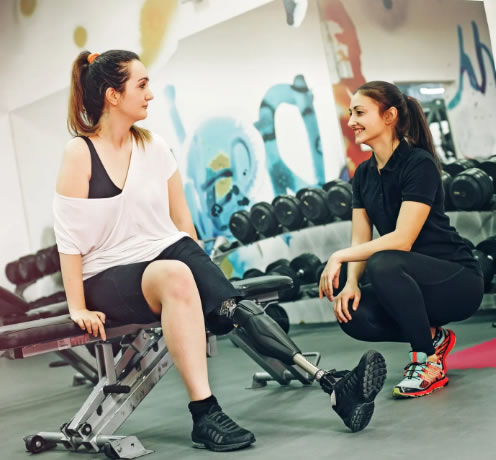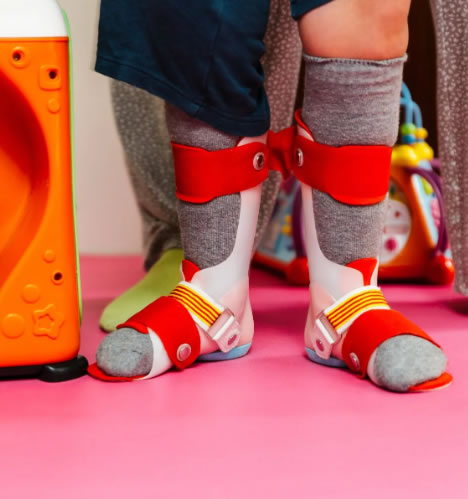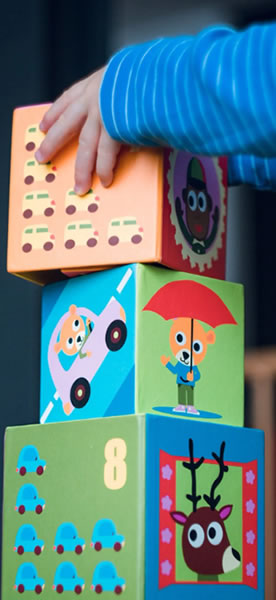PHYSIOTHERAPY
WHAT IS PHYSIOTHERAPY?
Physiotherapists are regulated health professionals with the College of Physiotherapists of Ontario who work with children and youth with movement difficulties to help them achieve their maximum level of functional independence and mobility. Physiotherapy promotes motor development and function; fosters independence; increases participation in daily activities and routines at home, school, daycare and community; and eases caregiving.
Practical suggestions may be given regarding:
- Positioning for activities of daily living
- Adapting toys for play
- Expanding mobility options
- Using equipment effectively and safely


WHAT CAN THE PHYSIOTHERAPIST PROVIDE?
At the THRIVE Child Development Centre, Physiotherapists provide services for children/youth from birth to 18 years of age with a variety of needs. The Physiotherapist works closely with the child, the family, caregivers, and other healthcare professionals to establish individualized therapy goals and treatment plans.
Physiotherapist work with children/youth who have difficulty with:
- Muscle and joint function
- Muscle tone
- Strength
- Mobility and gait
- Fitness
- Balance and coordination
- Posture and stability
- Sensory and neuromotor development
- Equipment, splinting, and bracing needs
- Transfers and lifts
- Safety and accessibility
- Recreational needs
PHYSIOTHERAPY
Check out our Physiotherapy Resources page for tip sheets and links to online resources to help get your little one up and moving.
SERVICES
Direct Therapy
Either individual or groups, offered by a therapist or therapy assistant.
Monitoring
The therapist trains someone else involved with the child/youth on a more regular basis to carry out the physiotherapy plan. The therapist is in regular contact with the person who carries out the program.
Consultation
Consultation with parents, caregivers, daycare staff, school staff, etc. to address the needs identified in the assessment and to help the client develop the skills to achieve their goals.
Home Programs
Home programs for use by parents, caregivers, daycare staff, and school staff.
Clinics
Physiotherapists are involved in a number of clinics at the Thrive Child Development Centre including:
Orthopedic
Orthotic
Botox
Neuromuscular
Collaboration
Collaboration with children, youth, and their families, caregivers, daycare, school staff, and other agencies to provide individualized treatment plans suited to each child/youth’s and family’s strengths and needs.
Education
Education and training for families, school personnel, and caregivers on gross motor programs, the use of equipment, safe lifting, and other related issues.
Intervention
The type(s) of intervention chosen will depend on the needs of the individual. The physiotherapist also supports the parents and caregivers to teach them how to help the child/youth in home, school, and community settings.

ASSESSMENT / ELIGIBILITY
Prior to intervention, the Physiotherapist will complete a comprehensive assessment to help understand your child/youth’s motor skills and interests. Therapists use a variety of observational and standardized assessment tools to measure physical and developmental changes. Therapists can help you understand your child/youth’s development and help you recognize their growth and development over time. As well as looking at motor development, the therapist will assess and try to better understand:
- How your child/youth’s bones and muscles work together to move their body.
- How your child/youth’s brain and nervous system work to move their muscle and bones.
- How well your child/youth’s muscles and nervous system work together to help them move around safely and independently in their home, school and community.
- Your child/youth’s need for equipment to help with mobility and functional skills such as transfers and stairs.
ELIGIBILITY
Our Physiotherapy team provides service to children who have differences/challenges with their mobility and/or their gross motor skill devleopment from birth through 18 years of age.
PHYSIOTHERAPY CLINICS
ORTHOPEDIC CLINIC
This clinic occurs twice a year and allows eligible children to see an orthopaedic surgeon for a consult without having to travel out of district. Children who have developed, or are at risk of developing, any of the following are eligible: Spinal or hip deformities, gait abnormalities, or muscle and joint dysfunction.
BOTOX CLINIC
Botox is a temporary neurotoxin that is injected into overactive muscles to relax them. This clinic can benefit children or youth who have increased muscle tone that affects their function and or results in increased pain. This clinic runs monthly and a physiotherapist, occupational therapist, and a paediatrician are all involved in the assessment.
ORTHOTICS CLINIC
This clinic helps children who require a brace or orthotic to help them participate more fully in activities with their friends. This clinic occurs monthly, and your physiotherapist will let you know if this clinic is the right fit for your family.
SEATING AND MOBILITY CLINIC
This clinic supports children and youth who require equipment or devices for their everyday mobility. We can provide assessment and prescriptions for the following devices: walkers, standing frames, and manual or electric wheelchairs.
GROWTH AND DEVELOPMENT CLINIC
This clinic provides assessment and follow up for children and youth who are school-aged and have significant gross motor delays. To participate in this clinic, the child and their family have specific goals related to improving gross motor skills to enable increased participation in community activities.
GAIT CLINIC
This clinic is for children over 3 years old who present with developmental differences related to gait (how they walk). Examples of needs would be toe walking or frequent falls that impact their ability to participate in activities with their family or peers.

